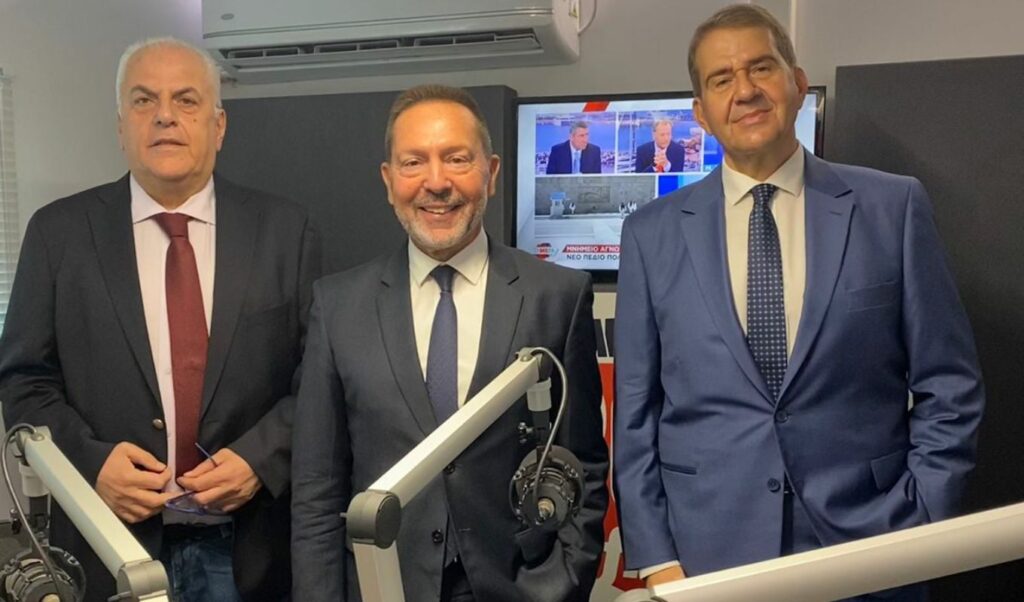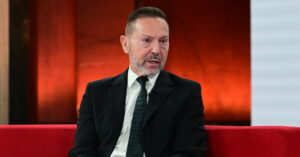Among other topics, Yannis Stournaras addressed rumors about renewing his term at the Bank of Greece during his appearance on Wednesday morning, October 15, on the show “Apenanti Mikrofona” with journalists Sotiris Xenakis and Vasilis Skouris, in the studio of radio station “Parapolitika 90.1“.
Yannis Stournaras on Parapolitika 90.1: “Of course we can see prices on shelves falling”
Yannis Stournaras gave a comprehensive interview covering banks, wages, the economy, and the country’s debt.
“The mandate we have from Germany is to specify economic policy. We are in a new era” Yannis Stournaras initially said, adding: “I entered politics during the crisis. I collaborated with three parties. It was a difficult period, but we didn’t do badly.”
When asked about rumors that the government would renew his term, Yannis Stournaras said: “My term expires in July 2026, so it’s too early to talk about such a thing.”
When journalists asked about the difference between interest rates and deposits, Yannis Stournaras said this occurs because banks have costs and must cover expenses. Additionally, it’s due to non-performing loans and provisions for issuing new loans. This creates the need for a margin, as he explained. Whether it’s large or small depends on many factors, such as liquidity. This could change with stronger competition in the banking system.
Regarding bank mergers, he was in favor, saying that “we want more banks, not fewer. We promote the outward orientation of the banking system.”
“We are growing at double the rate”
Continuing on post-crisis development, he said the country had returned to normalcy, describing it as a “success story.” Greece received the largest economic assistance any country has ever received in history. “We are growing at double the rate. The goal is for growth to trend downward,” he emphasized, also commenting on increases in incomes and wages. Furthermore, he clarified that Greece has growth above 2% and estimated this would continue in the coming years.
“We need more competition in Greece” said Yannis Stournaras. Regarding wealth overtaxation, he said that for these measures to work, there must be an international agreement and coordination. “Foreign investment is coming to Greece at double the rate compared to the past,” he noted.
Commenting on Lagarde’s statement about falling inflation but not prices, he said this was accurate. “Climate change affects food prices. 80% of inflation comes from international factors. We are integrated into the global economy. If we had more competition, we would benefit regarding inflation. We must distinguish between prices and inflation.” There is room for price margins from European actions as well. When journalists asked whether there was hope for significant price reductions on shelves, he said “of course we can see that.”
“The minimum wage has increased considerably”
Regarding wages, he said “The minimum wage has increased considerably. However, this doesn’t mean that if the minimum wage rises, the average wage will also rise. If, for example, the minimum wage increases by 10%, the average wage will increase by 5%.” The average wage covers inflation for dependent employment.
We entered the crisis for fiscal reasons and due to competitiveness issues. Wage and pension increases were given without corresponding productivity. So yes to increases, but only as much as productivity allows. This means greater reforms and transformations, which are already happening but need to happen more. Wage increases must be “supported” by the country’s economy, otherwise businesses will close.
Before the crisis, the trade balance had reached a large number. During the crisis, it was zeroed out. Neither extreme is correct. There must be balance. Production of intermediate goods (e.g., cars) and demanding goods is the “key.” We have the personnel. Greek scientists are among the best in the world. We lack the entrepreneurship to implement these ideas.
21 billion out of 36 billion have arrived. We rank sixth in absorption capacity. 3 billion will not be lost. When asked about deferred tax, he said the crisis brought tremendous changes. Banks suffered losses.




